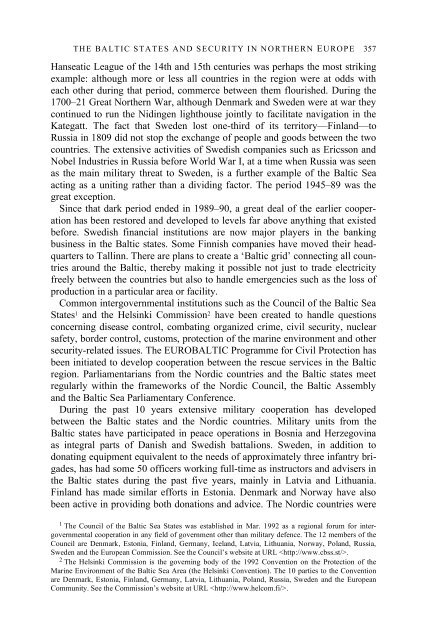The Nordic Countries and the European Security and Defence Policy
The Nordic Countries and the European Security and Defence Policy
The Nordic Countries and the European Security and Defence Policy
- No tags were found...
You also want an ePaper? Increase the reach of your titles
YUMPU automatically turns print PDFs into web optimized ePapers that Google loves.
THE BALTIC STATES AND SECURITY IN NORTHERN EU ROP E 357Hanseatic League of <strong>the</strong> 14th <strong>and</strong> 15th centuries was perhaps <strong>the</strong> most strikingexample: although more or less all countries in <strong>the</strong> region were at odds wi<strong>the</strong>ach o<strong>the</strong>r during that period, commerce between <strong>the</strong>m flourished. During <strong>the</strong>1700–21 Great Nor<strong>the</strong>rn War, although Denmark <strong>and</strong> Sweden were at war <strong>the</strong>ycontinued to run <strong>the</strong> Nidingen lighthouse jointly to facilitate navigation in <strong>the</strong>Kategatt. <strong>The</strong> fact that Sweden lost one-third of its territory—Finl<strong>and</strong>—toRussia in 1809 did not stop <strong>the</strong> exchange of people <strong>and</strong> goods between <strong>the</strong> twocountries. <strong>The</strong> extensive activities of Swedish companies such as Ericsson <strong>and</strong>Nobel Industries in Russia before World War I, at a time when Russia was seenas <strong>the</strong> main military threat to Sweden, is a fur<strong>the</strong>r example of <strong>the</strong> Baltic Seaacting as a uniting ra<strong>the</strong>r than a dividing factor. <strong>The</strong> period 1945–89 was <strong>the</strong>great exception.Since that dark period ended in 1989–90, a great deal of <strong>the</strong> earlier cooperationhas been restored <strong>and</strong> developed to levels far above anything that existedbefore. Swedish financial institutions are now major players in <strong>the</strong> bankingbusiness in <strong>the</strong> Baltic states. Some Finnish companies have moved <strong>the</strong>ir headquartersto Tallinn. <strong>The</strong>re are plans to create a ‘Baltic grid’ connecting all countriesaround <strong>the</strong> Baltic, <strong>the</strong>reby making it possible not just to trade electricityfreely between <strong>the</strong> countries but also to h<strong>and</strong>le emergencies such as <strong>the</strong> loss ofproduction in a particular area or facility.Common intergovernmental institutions such as <strong>the</strong> Council of <strong>the</strong> Baltic SeaStates 1 <strong>and</strong> <strong>the</strong> Helsinki Commission 2 have been created to h<strong>and</strong>le questionsconcerning disease control, combating organized crime, civil security, nuclearsafety, border control, customs, protection of <strong>the</strong> marine environment <strong>and</strong> o<strong>the</strong>rsecurity-related issues. <strong>The</strong> EUROBALTIC Programme for Civil Protection hasbeen initiated to develop cooperation between <strong>the</strong> rescue services in <strong>the</strong> Balticregion. Parliamentarians from <strong>the</strong> <strong>Nordic</strong> countries <strong>and</strong> <strong>the</strong> Baltic states meetregularly within <strong>the</strong> frameworks of <strong>the</strong> <strong>Nordic</strong> Council, <strong>the</strong> Baltic Assembly<strong>and</strong> <strong>the</strong> Baltic Sea Parliamentary Conference.During <strong>the</strong> past 10 years extensive military cooperation has developedbetween <strong>the</strong> Baltic states <strong>and</strong> <strong>the</strong> <strong>Nordic</strong> countries. Military units from <strong>the</strong>Baltic states have participated in peace operations in Bosnia <strong>and</strong> Herzegovinaas integral parts of Danish <strong>and</strong> Swedish battalions. Sweden, in addition todonating equipment equivalent to <strong>the</strong> needs of approximately three infantry brigades,has had some 50 officers working full-time as instructors <strong>and</strong> advisers in<strong>the</strong> Baltic states during <strong>the</strong> past five years, mainly in Latvia <strong>and</strong> Lithuania.Finl<strong>and</strong> has made similar efforts in Estonia. Denmark <strong>and</strong> Norway have alsobeen active in providing both donations <strong>and</strong> advice. <strong>The</strong> <strong>Nordic</strong> countries were1 <strong>The</strong> Council of <strong>the</strong> Baltic Sea States was established in Mar. 1992 as a regional forum for intergovernmentalcooperation in any field of government o<strong>the</strong>r than military defence. <strong>The</strong> 12 members of <strong>the</strong>Council are Denmark, Estonia, Finl<strong>and</strong>, Germany, Icel<strong>and</strong>, Latvia, Lithuania, Norway, Pol<strong>and</strong>, Russia,Sweden <strong>and</strong> <strong>the</strong> <strong>European</strong> Commission. See <strong>the</strong> Council’s website at URL .2 <strong>The</strong> Helsinki Commission is <strong>the</strong> governing body of <strong>the</strong> 1992 Convention on <strong>the</strong> Protection of <strong>the</strong>Marine Environment of <strong>the</strong> Baltic Sea Area (<strong>the</strong> Helsinki Convention). <strong>The</strong> 10 parties to <strong>the</strong> Conventionare Denmark, Estonia, Finl<strong>and</strong>, Germany, Latvia, Lithuania, Pol<strong>and</strong>, Russia, Sweden <strong>and</strong> <strong>the</strong> <strong>European</strong>Community. See <strong>the</strong> Commission’s website at URL .
















